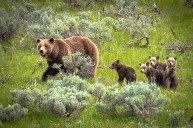I will be honest with you all: at first, this headline baffled me. Why on earth would someone be mad at an animal remaining on the Endangered Species List? After all, its purpose is to help stabilize populations that are at risk of extinction. However, Western lawmakers have a lot to say about the U.S. Fish and Wildlife Service's decision to keep grizzly bears on the Endangered Species List.
Why Western Lawmakers Are So Upset That Grizzly Bears Remain On The Endangered Species List

Shutterstock Image
Back in January, the U.S. Fish and Wildlife Service decided to keep grizzly bears on the Endangered Species List. While this may seem like a good idea because who doesn't want to save the grizzlies, Western lawmakers disagree. Their main issue with the case is that "the federal agency proposed in January to establish a single recovery zone for grizzlies." According to OutdoorLife, this zone would be known as a "distinct population segment." It would "do away with the six distinct recovery zones that have guided grizzly bear management for decades.
Currently, the recovery zones for grizzly bears include the following places:
- North Cascades (Washington, Candada)
- Bitterroot Recovery Zone (Idaho, Montana)
- The Greater Yellowstone Ecosystem (Wyoming, Montana, Idaho)
- Northern Continental Divide Ecosystem (Montana)
- The Cabinet-Yaak Ecosystem (Montana, Idaho)
- Selkirk Ecosystem (Idaho, Washington, Canada)
While the USFWS has high hopes of reaching this milestone, Western lawmakers are not so optimistic. They argue that this massive, interconnected population of grizzly bears is unrealistic. The main reason is that the four-state region is no longer connected by viable grizzly bear habitat. Furthermore, with more human development taking place each year, the odds of these areas joining together are becoming even slimmer.
Not only that, but Western lawmakers also argue that keeping grizzly bears on the Endangered Species List undermines the whole point of the list and disregards "the achievements that have already been made in the Lower 48. "Multiple state representatives joined together in crafting a letter to address the issue. Outdoorlife shares some of the contents of that letter. It read, "We should be celebrating the recovery grizzly bears have made through the dedication and sacrifice of the people who must live with these bears in their backyards."




